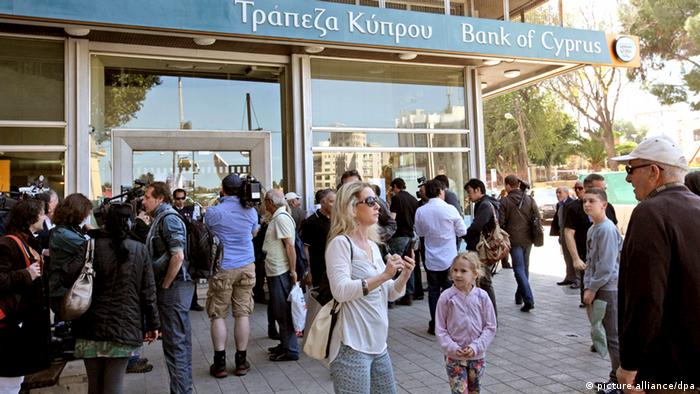Cypriots are reported to be waiting calmly to withdraw money after the country's banks opened for business for the first time in almost a fortnight. The government has imposed restrictions on how much can be withdrawn.
Correspondents in the capital, Nicosia, reported a couple of hours after the banks opened their doors on Thursday that Cypriots were generally going about their business in an orderly manner. Security personnel were limiting the number of people being allowed into any one bank at one time, but the lines didn't appear to be as long as some had feared.
Although the banks did not open until midday local time, preparations had begun several hours earlier. Overnight, container trucks transported filled with billions of euros in cash that had arrived at the airport at Larnaca and rolled up to the central bank in Nicosia. Security was tight for the operation, with a helicopter hovering above the convoy and police armed with rifles stationed around the central bank's compound.
The funds, reportedly sent by the European Central Bank (ECB) late on Wednesday, were meant to ensure that banks could meet a pent-up demand for cash.
On the first day the banks opened for business since March 16, account holders were limited to withdrawing just 300 euros ($384) per day. There are a number of other restrictions, including a ban on the cashing of checks and a limit on the use of debit or credit cards while abroad to 5,000 euros.
The Reuters news agency quoted a police source who said security was conducting extra checks of passengers departing from Cypriot airports to ensure that they were not trying to take more than the allowed 1,000 euros out of the country.
The tight controls were imposed in an effort to prevent a possible run on the banks after Cyprus sealed a 10-billion-euro bailout from the “troika” of the ECB, the European Union and the International Monetary Fund early on Monday.
Part of the bargain to secure the bailout was that Cyprus raise 5.8 billion euros, which is to include a hefty levy on deposits of more than 100,000 euros. The actual figure had not been determined, but there have been reports that it could be as much as 40 percent.
A previous plan, which would have seen a minimum 6.75 percent tax applied to all bank accounts, was voted down by Cypriot lawmakers last week.
The government has announced that the current capital controls, which have been imposed for an initial seven-day period, would be lifted as soon as possible. However, many analysts believe they are bound to remain in place for at least several weeks or months.
pfd/mkg (Reuters, dpa, AFP DW DE


No comments:
Post a Comment